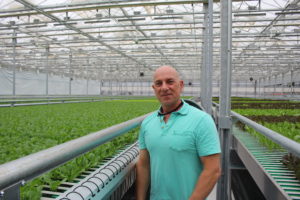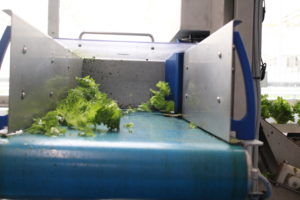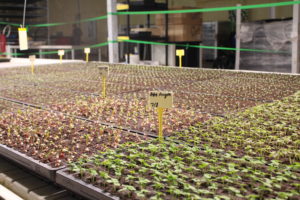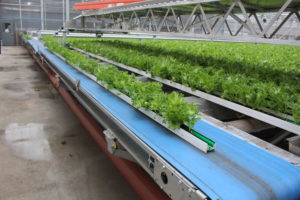Revolution Farms continues to expand, provide locally grown leafy greens to Midwesterners
Michigan is known for many crops, but leafy greens isn’t one of them. Consumers in the Great Lakes region who rely on store-bought produce have traditionally bought lettuce, leafy greens and bagged salads grown in California or Arizona.
With a recent expansion that added 2 acres (85,000 square feet) of greenhouse growing space, Revolution Farms, located just south of Grand Rapids, is working toward giving Midwesterners more options for greens grown in the region. The expansion has tripled the operation’s output capabilities to about 1.5 million pounds a year.
Revolution Farms utilizes a Green Automation automated gutter system that allows greens, with the use of hydroponics, to be planted, grown, harvested and processed all within the greenhouse, which cuts down on pathogen risk of outdoor growing.

“In other growing areas, they’re subject to other environmental concerns, whether it be floods, fires or whatever else,” said head grower Tam Serage, who joined the company in late 2019. “Here, everything is grown and processed indoors, so we have very little chance of animal contamination. We don’t have deer or other creatures running through here, like you would out in the field.
“So, we feel much better about our food safety.”
The expansion also has allowed Revolution Farms to grow more varieties. The company leans on its seed suppliers for access to the latest varieties that do well with its LED lighting system.

“We’ve fine-tuned the greenhouse aspect of growing, in terms of environmental control,” Serage said. “We are using different lights than we have in the past, and we’re growing different varieties. We’ve gone to more high-yielding varieties and varieties that do better under LED lights and indoor growing.”
Chief operating officer Dan Vukcevich said the primary goals were to increase plant density in the facility without increasing labor costs. More processing equipment was required, but due to the automation, little additional labor.
“So, we’ve got like six times the plant density, but you also get a lot less labor,” he said. “So, we can add all these additional pounds without adding people out there.”
The facility continues to add more lines of production with its existing equipment.
“We’re opening another 18 lines going west and utilizing all the same seeding and harvesting equipment, so the investment is a lot less than we originally put in to basically triple the growth,” Vukcevich added.
Sales and marketing
In addition to Serage coming on in 2019 as head grower, John Green also became CEO that year. Green, a longtime executive chairman at Grand Rapids-based Founders Brewing Co., was a founding investor in Revolution Farms.
Founders, which started a small startup craft brewery in the late 1990s, has grown into a global brand.

“Working with Founders gave me an understanding of startups, scaling a business, and how to help the founding partners build a unique company in West Michigan,” Green said. “While farming is different from craft beer, the common thread between the two companies is how they create innovation and distinction in a commodity industry. While there were already large-scale, nationally renowned breweries making beer that people loved, we also have legacy farms growing lettuce, the same way they have for hundreds of years.”
Revolution Farms put a premium on packaging, varieties, package size and marketing as locally grown.
“With Revolution Farms, as with Founders, we are disrupting through innovation by providing consumers with a more local experience, creating unique brands, building a best-in-class team and doing it in a sustainable way,” Green said. “There are even similarities as we look at packaging design, naming conventions and package sizes, which all translate in some way from my experience in the world of beer.”
Revolution Farms has deals with major supermarket chains Meijer and Spartan, but also has good relationships with many independent retailers in the region. Vukcevich said the appeal of safe, local and fresh is easy to market to buyers, but it can be tricky in defining terms from retailer to retailer.

“The challenge is when you get into the logistics. What does local mean?” Vukcevich said. “For us, it’s easy. Local is Michigan. Retailers, though, all view that a little differently. Local might mean a farm closer to some retailers. For us, it’s morphing. We have 45 acres here, we could build a super farm, but that might not be the right answer for the retailers. They want local and fresh whenever they can get it, but they also don’t want to deal with 30 or 40 small growers. They want a big grower that can handle it, and there are a few of them out there. I think we’re headed that way to produce at scale for lots of their stores, so they don’t have to have 10 or 20 different relationships.”
While Revolution Farms has most common certifications demanded by retailers, including adding Primus this year, the facility is not pursuing certified organic.
“Organic certification is about soil stewardship, but we don’t use soil,” Vukcevich said. “We can comply and call it organic, but it really doesn’t do anything to help the soil. Really, it’s just a badge, and we don’t think it’s that important right now.”
The company uses the phrase “better than organic” in its marketing. It cites greenhouse growing as using less water and taking up less acres.
“’Better than organic’ means something to us, but we realize some people don’t understand that. Greenhouse-grown is a safe, efficient way to grow lettuce,” Vukcevich said.







